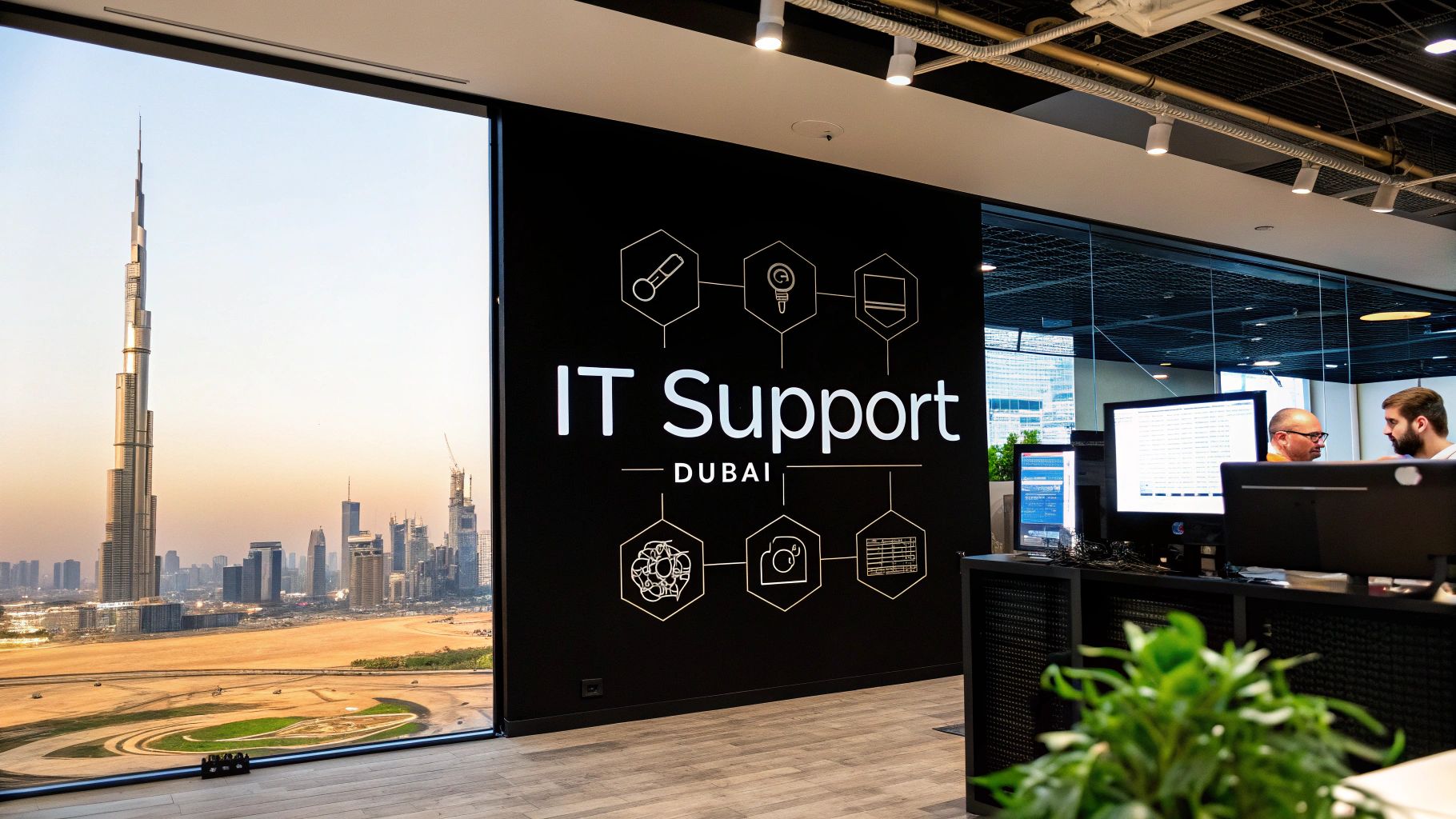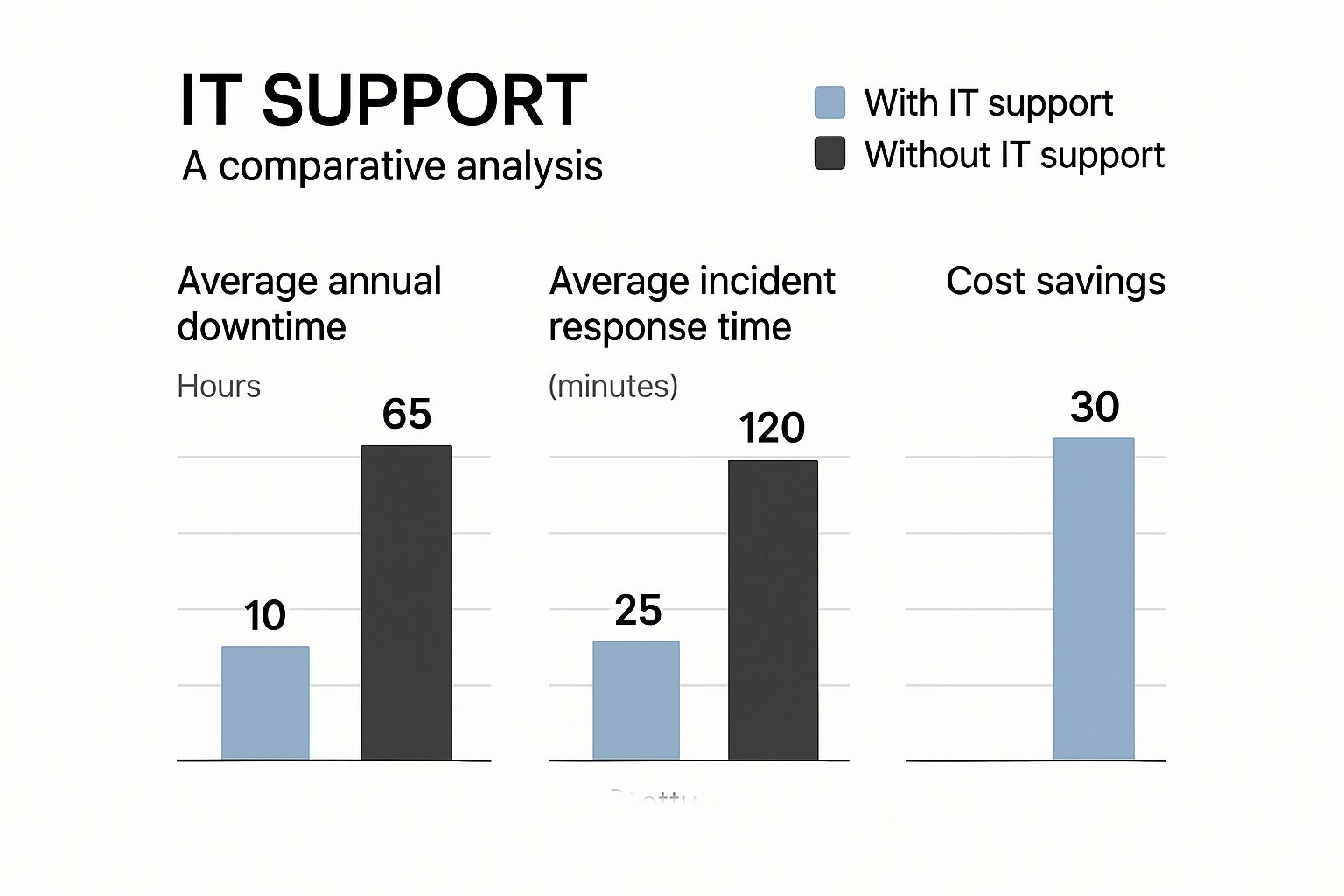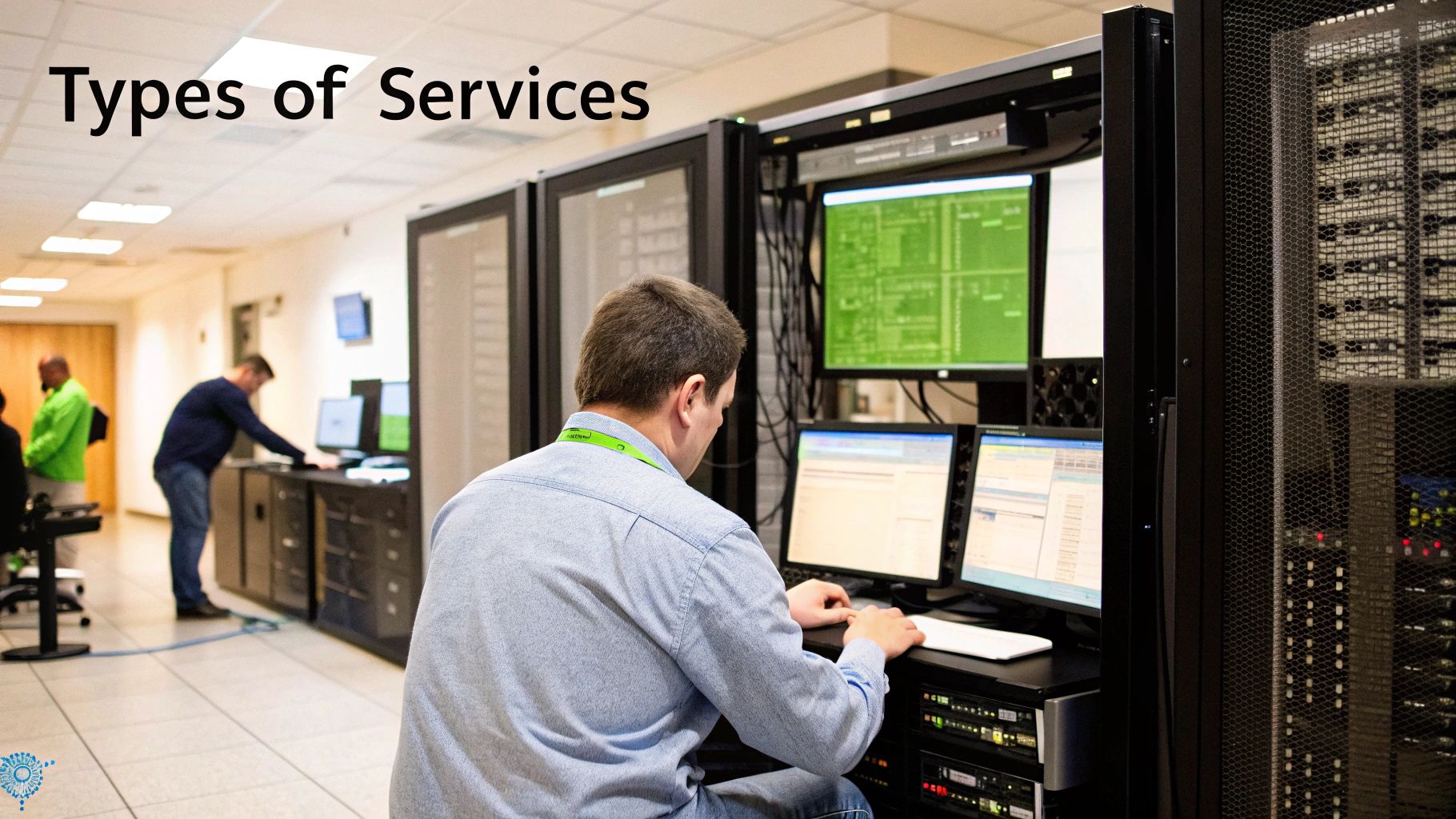
In a city like Dubai, where business moves at lightning speed, technology is more than just a convenience—it’s the very pulse of your operation. Professional IT support services in Dubai are what keep that pulse steady, ensuring your systems are secure, efficient, and ready to innovate. Think of it as the expert crew that keeps your ship sailing smoothly, preventing small leaks from turning into major disasters.
Why IT Support Is Your Business Lifeline in Dubai
Trying to run a company in Dubai without solid IT support is like trying to navigate Sheikh Zayed Road during rush hour with a faulty GPS. It’s slow, frustrating, and you’re bound to get stuck. In a city driven by ambitious government tech initiatives and fierce competition, a reliable technology backbone isn’t just nice to have; it’s a fundamental requirement for staying in the game. Your ability to compete is directly linked to how well your IT infrastructure performs.
This isn’t just a hunch; the numbers back it up. The UAE’s IT services market is on a steep upward trajectory, expected to grow at a compound annual growth rate (CAGR) of about 9.2% between 2025 and 2030. What’s really telling is that a massive 54.16% of this spending comes from reactive services—companies calling for help only after something has broken. This shows just how dependent key sectors like banking, healthcare, and logistics are on having experts ready to jump in. You can explore more about these market trends and see what they mean for your business.
The Strategic Shift from Cost to Asset
For years, many businesses treated IT support as just another line item on the expense sheet—something to be kept as low as possible. That mindset is not just outdated; it’s dangerous. Today, smart businesses see IT as a strategic asset, an investment that pays for itself through better productivity, stronger security, and the simple ability to keep the doors open.
In Dubai’s digital-first economy, the question has changed. It’s no longer if you need IT support, but how deeply you should weave it into your business strategy. Proactive IT management is what separates the market leaders from the companies just trying to keep up.
This shift is all about moving away from the “break-fix” model. It’s about using expert guidance to get the most out of everything, from your cloud setup to your cybersecurity posture. A well-managed IT environment, for example, can:
- Prevent Downtime: Instead of waiting for a crash, proactive monitoring spots and fixes problems before they can bring your business to a halt.
- Secure Business Data: Expert teams put advanced security measures in place to shield your company from the constant threat of cyberattacks.
- Enable Scalability: As your business expands, a good IT partner makes sure your technology can grow with you, smoothly and without friction.
Aligning Technology with Business Goals
At the end of the day, the real purpose of premier IT support services in Dubai is to make sure your technology is helping you achieve your business goals. It doesn’t matter if you’re a startup aiming for explosive growth or an established company looking to streamline operations. The right IT partner gives you the technical horsepower you need, so you can stop worrying about technology and focus on what you do best: running your business.
Decoding The Different Types Of IT Support
When it comes to IT support services in Dubai, one size definitely does not fit all. Picking the right kind of support for your business is a bit like choosing a vehicle for a specific journey. A zippy sports car is fantastic for a quick trip, but you wouldn’t use it to move your family across the country. In the same way, the IT support model that works for a tiny startup might be a recipe for disaster for a growing company that can’t afford any downtime.
Getting a handle on the different models is the first real step toward making a smart, strategic decision for your company’s tech infrastructure. Let’s break down the jargon and look at what these services actually mean for your day-to-day operations.
The Reactive Approach: Break-Fix Support
Think of the break-fix model as having a plumber on speed dial. Your pipes burst, you panic, and you call someone to come and fix the immediate mess. You pay them for their time and the parts they used, and once the leak is patched up, they’re gone. This is the very essence of break-fix IT support.
With this model, you only call—and pay for—IT services when something breaks. A server gives up, a colleague’s laptop won’t turn on, or your entire network goes offline. You make the call, and an expert comes in to solve that one specific issue. For very small businesses with simple IT needs and a high tolerance for potential delays, this can seem like the cheapest option at first glance.
But this reactive approach has some serious downsides. Your IT provider’s business model is built on your problems; they only make money when things go wrong. This creates a fundamental conflict of interest, where your downtime is their billable time. It often leads to unpredictable costs and the same frustrating issues popping up again and again.
The Proactive Approach: Managed IT Services
Now, let’s flip that scenario. Instead of just a plumber on call, imagine you have a comprehensive building maintenance contract. This agreement covers regular inspections, preventative upkeep, and round-the-clock monitoring to make sure the plumbing, electrical, and structural systems are always in peak condition. This is the proactive philosophy that drives Managed IT Services.
Under a managed services model, you partner with an IT provider for a predictable, flat monthly fee. They essentially become your outsourced IT department, taking on the full responsibility of keeping your technology running smoothly and securely. Their goal isn’t to fix problems; it’s to stop them from ever happening in the first place.
This proactive stance completely changes the dynamic. The managed service provider (MSP) is profitable when your systems are stable, not when they’re failing. This means they are constantly working behind the scenes to:
- Monitor your network 24/7 to spot potential issues before they escalate.
- Deploy security patches and updates to guard against the latest threats.
- Manage and test data backups to guarantee business continuity.
- Provide strategic guidance on how technology can help you achieve your business goals.
To help you see the difference clearly, let’s compare these two models side-by-side.
Comparing IT Support Models For Dubai Businesses
| Feature | Break-Fix Support (Reactive) | Managed IT Services (Proactive) |
|---|---|---|
| Cost Structure | Unpredictable, hourly rates & parts | Predictable, flat monthly fee |
| Service Goal | Fix problems as they occur | Prevent problems from happening |
| Incentive | Provider profits from your downtime | Provider profits from your uptime |
| Budgeting | Difficult to forecast expenses | Easy, consistent monthly cost |
| Downtime | Higher, as issues must occur first | Minimised through 24/7 monitoring |
| Strategic Focus | None; purely a transactional fix | Long-term partnership and planning |
| Best For | Very small businesses with minimal IT | SMEs and enterprises seeking stability |
This comparison makes it clear: for most businesses in Dubai—from ambitious SMEs to established enterprises—managed services offer a far more strategic and ultimately cost-effective solution.

The data speaks for itself. Investing in proactive support drastically cuts down on costly downtime and slashes response times, delivering real savings and proving its worth as a strategic business asset.
Specialised IT Support Services
Beyond these core models, many providers of IT support services in Dubai also offer specialised expertise. Think of these as bringing in a specialist to join your core maintenance team when you need a higher level of skill in a specific area.
An IT strategy isn’t just about fixing what’s broken; it’s about building a technological foundation that is secure, resilient, and ready for future growth. Choosing the right services is central to that mission.
Here are a few specialisations that are critical for modern businesses:
- Cybersecurity Services: With the constant threat of digital attacks, this is no longer optional. This service is like hiring a dedicated security firm for your digital world, one that actively defends you against malware, phishing scams, and costly data breaches.
- Cloud Management Services: Effectively managing your infrastructure on platforms like Microsoft Azure or Amazon Web Services (AWS) is a complex job. A cloud manager acts as an expert pilot for your company’s data, ensuring you navigate the digital skies safely, efficiently, and without overspending.
- Data Backup and Disaster Recovery: This is your ultimate business insurance policy. It guarantees that if the worst happens—from a server meltdown to a natural disaster—you can recover your critical data and get back to business with minimal disruption.
By understanding these different layers of support—from the simple reactive model to proactive managed services and vital specialisations—you can make a truly informed choice that aligns with your company’s budget, operational needs, and future ambitions.
Gaining a Competitive Edge With Professional IT Support
How exactly does technical support lead to real business growth? It’s a fair question for any business trying to thrive in Dubai’s cut-throat market. The secret is to stop seeing IT as just another expense and start treating it as a strategic tool for growth.
Let me tell you a story about a local logistics company that was struggling. Their experience really brings this idea to life.
Initially, their approach to IT was purely reactive. When something broke, they called someone to fix it. This “break-fix” model meant they were constantly dealing with network outages, painfully slow systems, and a whole lot of staff frustration. They were stuck in a cycle of downtime and lost productivity, with their team always fighting fires instead of focusing on what they do best: logistics and keeping clients happy.

From Reactive Chaos to Proactive Control
The real change happened when they switched to a managed IT services provider. Instead of just waiting for disaster to strike, their new partner put a proactive strategy in place. This wasn’t about fixing problems faster; it was about stopping them from happening in the first place. The results were immediate and powerful.
First off, with proactive maintenance and 24/7 monitoring, system downtime practically vanished. For a logistics company where every single minute is money, this was a complete game-changer. Productivity shot up, delivery schedules became more reliable, and customer trust grew.
Next, their partner completely revamped their cybersecurity. They set up strong defences, ran regular checks for weak spots, and trained the staff on how to spot threats. About six months later, a major phishing attack hit their industry. While their competitors were in a panic, dealing with data breaches, this company’s defences held firm. They were completely protected from what could have been a financial and reputational nightmare.
Unlocking Strategic Financial and Scalable Growth
One of the biggest wins was moving to a predictable cost model. The days of surprise, wallet-busting repair bills were over, replaced by a fixed monthly fee. This gave them incredible financial control and made budgeting for technology simple and clear.
A proactive IT partner does more than just maintain systems; they build a resilient and scalable foundation that allows your business to seize opportunities without being held back by its own technology.
This newfound stability was the perfect launchpad for growth. When the time came to open a new warehouse in Abu Dhabi, scaling up was a breeze. Their IT partner had designed their systems with expansion in mind from day one. They handled the entire setup, getting the new site connected securely without causing any disruption to their ongoing operations.
This story really gets to the heart of what’s happening in the market. The managed IT services sector in the UAE is expected to grow by 3.29% every year, hitting an estimated value of $90.79 million by 2029. This boom is happening because more and more companies are realising that outsourcing their IT saves money, improves reliability, and tightens security. You can discover more about the rise of managed IT services in the UAE and how it’s fuelling business expansion.
Ultimately, by investing in professional IT support services in Dubai, the logistics company didn’t just solve its tech headaches. It built a genuine competitive advantage based on:
- Enhanced Operational Efficiency: With downtime minimised, they simply got more work done.
- Rock-Solid Cybersecurity: Protecting their data built immense trust with clients and dodged costly breaches.
- Predictable Budgeting: Fixed costs meant smarter financial planning across the board.
- Effortless Scalability: Technology was no longer a roadblock to growth; it was the engine.
Their journey proves that the right IT partnership isn’t a cost—it’s a strategic investment that delivers real returns in productivity, security, and long-term success.
How To Choose The Right IT Support Partner In Dubai
Picking a partner for your IT support services in Dubai is one of the most important decisions you’ll make for your business. This isn’t just about finding someone to fix a broken laptop. You’re trusting them with the keys to your entire digital operation. The right provider feels like a natural extension of your own team, boosting efficiency and security. But the wrong one? That leads to endless frustration, surprise bills, and dangerous vulnerabilities.

To get this right, you need a clear-headed approach. This isn’t a choice to be rushed. The goal is to find a provider who not only has the technical chops but also truly understands the unique rhythm of doing business in Dubai. Let’s walk through the essential things to look for.
Look For Local And Industry-Specific Expertise
First things first: your IT partner needs to be grounded in the local landscape. A provider with a real presence in Dubai brings invaluable on-the-ground knowledge. They understand the regional business culture, specific compliance rules, and already have relationships with local tech suppliers. This local advantage is critical when you need someone on-site, fast.
Beyond just being local, they need to know your world. The IT challenges of a law firm are completely different from those of a logistics company or a retail chain. A provider who has other clients in your sector will already be familiar with your core software, operational headaches, and regulatory pressures. This kind of specialised experience cuts down the learning curve and delivers better, faster solutions.
Scrutinise The Service Level Agreement
The Service Level Agreement, or SLA, is the single most important document you will sign. Think of it as the rulebook for your partnership. It spells out, in black and white, exactly what level of service you can expect. Don’t just skim it; you need to examine every detail.
A solid SLA must clearly define:
- Guaranteed Response Times: How quickly will they acknowledge your support ticket?
- Resolution Times: What’s the target for fixing different problems (e.g., critical system down vs. a minor glitch)?
- System Uptime Guarantees: What percentage of uptime do they promise for your most important systems?
- Penalties for Non-Compliance: What happens if they don’t meet these promises?
A detailed SLA is your best defence against poor service. It transforms vague promises like “fast support” into a concrete, legally-binding commitment and holds your provider accountable.
Vet Testimonials And Case Studies
Any IT company can say they’re the best. You need to see the proof. Don’t just look at the impressive logos on their website; ask for detailed case studies and, even better, client references you can actually call.
When you review their past work, look for stories from businesses that are a similar size and in the same industry as you. Zero in on the specific problems they solved and the measurable results they achieved. Did they cut downtime by a certain percentage? Did they help a client navigate a complex security audit? These details are where you find proof of real capability.
This homework is more important than ever. As the UAE pushes its national technology goals, the IT support sector in Dubai is booming. The wider UAE ICT market is set to grow by 6.24% annually between 2025 and 2029, hitting a market size of around $4.79 billion. With so many new players jumping in to serve key industries like banking and healthcare, you must verify a potential partner’s claims with real-world evidence. You can learn more about the UAE’s strategic IT development on globalcio.com.
Ask The Right Questions About Security And Scalability
Finally, your thinking needs to be future-focused. Your business isn’t going to stand still, so your IT partner needs to be ready to grow with you. Two of the most critical areas to investigate are cybersecurity and scalability.
Get direct and ask tough questions about their security protocols. How do they protect their own network? What’s their process for detecting threats and responding to an incident? They should be able to give you clear, confident answers that show they take security seriously.
Just as important is their ability to scale. Talk to them about your growth plans. Ask how their services can adapt as you hire more people, open new offices, or bring in new technologies. A true partner won’t just support your business today; they’ll work with you to build a technology roadmap that gets you where you want to go tomorrow.
Navigating IT Support Pricing Models

Getting a handle on how IT support is priced is the first step toward making a smart investment for your business. When you start exploring IT support services in Dubai, you’ll quickly realise that providers have a few different ways of structuring their fees. Picking the right one is absolutely crucial for keeping your budget in check and making sure you get the value you’re paying for—without any nasty surprises down the road.
Each pricing model is built for different kinds of businesses, from scrappy start-ups to established enterprises. So, let’s break down the most common structures you’ll come across in the Dubai market. This way, you can confidently choose a plan that actually fits your operational needs and financial reality.
Per-Device And Per-User Models
Two of the most common and easy-to-understand pricing structures are the per-device and per-user models. They give you a clear, straightforward way to figure out your monthly costs, which is why they’re so popular with businesses that value predictability.
In a per-device model, you pay a set fee for every piece of hardware your IT provider manages. This means every desktop, laptop, server, and even the office printers. It’s a simple calculation, making it a great fit for businesses that have more equipment than people, like a manufacturing facility or a design studio.
The per-user model works in a similar way, but your bill is based on the number of employees using the service, no matter how many devices they have. One monthly fee per person could cover their work computer, laptop, and smartphone. This is often the go-to model for modern offices where people switch between devices all day long, as it scales perfectly with your team size.
Tiered And All-Inclusive Plans
Another popular approach you’ll see is the tiered model. Think of it like a subscription service where you pick your plan. Providers will typically offer a few different packages—often named something like Bronze, Silver, and Gold—with each tier offering more services for a higher monthly price.
- Bronze Tier: This usually covers the basics, like system monitoring and remote helpdesk support. It’s a good starting point for businesses with simple IT needs.
- Silver Tier: This level might add in proactive maintenance, security updates, and maybe some on-site support, making it a solid, balanced option for growing companies.
- Gold Tier: This is the premium package, often bundling everything from the lower tiers with strategic advice, 24/7 support, and advanced cybersecurity for businesses where tech is mission-critical.
This structure lets you align your support level with your budget and how much risk you’re willing to take on. Just be sure to read the fine print. You need to know exactly what’s included in your tier to avoid getting hit with extra charges for “out-of-scope” work.
The most comprehensive option is the all-inclusive flat-rate plan, sometimes called an “all-you-can-eat” model. This is the gold standard for managed services. You pay one predictable monthly fee for absolutely everything: unlimited support, round-the-clock monitoring, strategic planning, and top-tier security.
This model is perfect for businesses that can’t afford any downtime and want a true partnership. Because the provider only makes a profit if your systems are stable and secure, their goals are perfectly aligned with yours. They become a genuine extension of your team, incentivised to prevent problems before they start. It’s a hallmark of the best IT support services in Dubai and the right choice for any company that depends on its technology to function.
Making IT Support a Core Part of Your Business Strategy
Throughout this guide, we’ve walked through everything you need to know about IT support services in Dubai, from the basic definitions right up to choosing the right partner. If there’s one thing to take away, it’s this: thinking of IT support as just an operational cost is an outdated view. It’s truly an investment in your company’s ability to survive, run smoothly, and outpace the competition.
Treating your tech support like an emergency service you only call when something is broken is a recipe for disruption. It’s a reactive stance that leaves your business exposed. The real shift happens when you move to a proactive partnership, where an expert team is constantly working behind the scenes to stop problems from ever happening. That’s how you go from constantly putting out fires to being in full control.
From Technical Fixes to Strategic Growth
Integrating IT into your core business strategy is about making sure every tech decision lines up with your bigger business goals. It’s the difference between asking, “How do we fix this broken server?” and asking, “How can our technology help us expand into a new market?” This change in perspective turns IT from a simple utility into a genuine engine for growth.
A real IT partner brings more than just technical know-how to the table; they offer strategic foresight. They’re the ones who help you see around corners, spotting potential issues and opportunities so your technology is always ready to support your ambitions.
Your IT support provider should be a strategic asset, actively helping you grow. Their success isn’t just measured by how fast they fix things, but by how few things break in the first place.
This strategic relationship is built on a few key ideas we’ve covered:
- Proactive Maintenance: Keeping a constant eye on your systems to prevent downtime before it starts.
- Robust Cybersecurity: Building a strong defence for your digital assets to protect your money and your reputation.
- Predictable Budgeting: Moving to a flat-rate model that gives you financial stability and no nasty surprises.
- Informed Scalability: Making sure your systems can grow right alongside your business, without any hiccups.
Preparing for Tomorrow’s Challenges Today
Looking ahead, the need for expert IT support services in Dubai is only going to grow. New technologies are changing the game for every industry, creating both exciting opportunities and new headaches. A forward-thinking IT partner gets you ready for what’s coming, ensuring your business isn’t just reacting to the future, but actively shaping it.
So, the final takeaway is simple. Take a hard look at your current IT situation using the insights from this guide. Are you reactive or proactive? Is your IT provider just a vendor you call, or a true strategic partner? Getting professional IT support on your side builds a stronger, more efficient, and more competitive business that’s ready for whatever comes next.
Frequently Asked Questions
It’s only natural to have questions when you’re looking into IT support for your business in Dubai. Getting the right answers is the key to making a smart decision you’ll feel good about later. Let’s tackle some of the most common things business owners ask.
We’ll break them down in plain English to help you see the path forward.
What’s the Average Cost for an SME in Dubai?
This is the big question, and the honest answer is: it depends. There’s no single price tag for IT support because it’s not a one-size-fits-all service.
Think of it like this: a simple pay-as-you-go ‘break-fix’ service is like calling a plumber only when a pipe bursts. You pay for the emergency call-out. A proactive managed service, however, is like having a maintenance contract to check your plumbing regularly to prevent bursts. This usually comes with a fixed monthly fee.
For a small to medium-sized business here in Dubai, that monthly fee can range from a few thousand to several thousand AED. What pushes the price up or down?
- The number of people on your team who need support.
- How many devices (laptops, servers, desktops) you have.
- The level of service you need – a basic helpdesk is very different from a package with advanced cybersecurity protections.
The only way to get a real number is to ask for a custom quote that reflects exactly what your business needs.
Do I Really Need a Local Dubai-Based Company?
With so much tech support happening remotely these days, it’s a fair question. But having a local partner in Dubai gives you a serious edge that you shouldn’t ignore.
A local provider isn’t just about convenience. It’s about having boots on the ground for critical hardware failures and a team that genuinely understands the local business culture. That kind of insight is priceless.
A team that operates in Dubai gets the specific challenges and rules of doing business here. They have connections with local suppliers and understand the regional compliance landscape. This local knowledge makes everything, from buying new equipment to navigating regulations, run much more smoothly.
What Is the Difference Between IT Support and Managed Services?
Understanding this difference is crucial. Traditional IT support is reactive. It’s the classic “break-fix” approach: something breaks, you call for help, and someone fixes it. It’s essentially an emergency service for your tech.
Managed IT Services, on the other hand, are proactive. Instead of waiting for a disaster, your provider is constantly monitoring and maintaining your systems to stop problems before they even start. This is what you get with a flat-rate monthly fee. The goal isn’t just to fix things quickly, but to create an environment where things rarely break in the first place.
At OMX Solutions L.L.C., we believe in clear, proactive IT support that lets you focus on your business, not on tech troubles. To see how our services can help your Dubai company thrive, visit our website and find out what we can do for you.
Article created using Outrank
